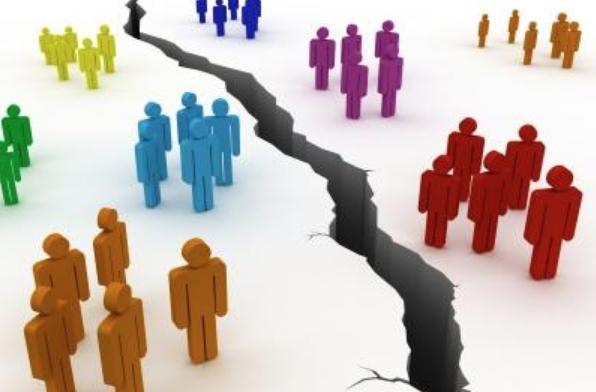We pay professional therapists to listen to us, but we can’t afford the time or effort to listen to others with divergent views.
Two friends in the county have views diametrically opposed to mine. Yet we enjoy a depth of civility and friendship that transcends our polar opposite viewpoints. We refuse to poison our communication with insults and personal attacks.
It seems that civil dialogue or any discourse between those on opposite ends of the political spectrum is rare. Either politics deliberately doesn’t come up in conversation, or the differing persons simply avoid each other. We all know this sad tale; the polarization seems a stubbornly omnipresent fact of life today. It’s a shame.
Maybe it’s overstated. Maybe it’s not. Divisiveness seems entwined these days with the human condition.
Just recently, I spent 90 minutes at lunch with some people whose viewpoints differed greatly from mine. Conversation was difficult at times. Fortunately, each person generally spoke without emotion and recrimination—not entirely, but mostly. A sense of friendship and respect seemed to emerge at the same time as dessert and coffee.
I won’t dwell on the lunch. However, I will talk about “Better Angels,” as reported recently by CBS News. I was dismayed but not surprised by the stark differences of opinions about gun control; the discussion lasted 18 months in Lebanon, Ohio.
What interested me is that this method of overcoming ill will is the same as confronting and overcoming harmful bias. In fact, two members of the “focus group”—one an Iranian-American and the other an evangelical Christian—described how their initially fraught relationship evolved into one of warm friendship. The therapeutic process worked.
What seems new and striking about the discussion and its byproduct of friendship is not a new phenomenon It just stands out due to the bigotry and stridency expressed in our times in some quarters. The abusive language harms our democracy; it consigns compromise and tolerance to the outer reaches of human behavior. Productive discourse seems unfathomable.
In President Abraham Lincoln’s first inaugural address, presented on March 4, 1861, on the eve of the Civil War, voiced a yearning for a time when “the mystic chords of memory, stretching from every battlefield and patriot grave to every living heart and hearthstone all over this broad land, will yet swell the chorus of the Union, when again touched, as surely they will be, by the better angels of our nature.”
In futility, Lincoln hoped for an outcome free of mortal combat and societal schism.
Striking a different, yet forgiving and conciliatory tone in his second inaugural address delivered in March 1865 just before the end of the wrenching Civil War, Lincoln said:
“With malice toward none; with charity for all; with firmness in the right, as God gives us to see the right, let us strive on to finish the work we are in; to bind up the nation’s wounds; to care for him who shall have borne the battle, and for his widow, and his orphan—to do all which may achieve and cherish a just and lasting peace among ourselves, and with all nations. “
Analyzing Lincoln’s second address and the current state of relationships in our fractious nation, Paul Cox, a friend, wrote:
“The second address anticipated the end of the war and the great job of reconciliation – it is generally accepted that Lincoln, the great captain, would have steered the ship of state more successfully through the turbulent post-war years. We cannot know. But we look back from here and see so many issues still unreconciled, wounds still not healed.
“Has it been malice? Has it been a lack of charity? As this world spins around, there are many strong centrifugal forces that would throw us all apart. The act of listening to people with diametrically opposed political views would be one of the first things necessary to assure us being held together.”
Paul arrives at the same conclusion as I did: civility has suffered as those on the opposite ends of the political spectrum adamantly avoid, if not disdain, listening to people whose opinions, though well-thought out, seem anathema to our ears. We won’t and don’t listen. We believe that the search for common ground is meaningless.
The quest for comity is a bumpy, uncomfortable road. It offers risks; we might change our minds. We might respect and even like the person whose opinions are bothersome.
All of us embody “better angels.”
Columnist Howard Freedlander retired in 2011 as Deputy State Treasurer of the State of Maryland. Previously, he was the executive officer of the Maryland National Guard. He also served as community editor for Chesapeake Publishing, lastly at the Queen Anne’s Record-Observer. In retirement, Howard serves on the boards of several non-profits on the Eastern Shore, Annapolis and Philadelphia.



Al Sikes says
Lincoln, America’s mother lode. We should return to him over and over. Thank you.
Bill Todd says
Well said.
Jonathon Powers says
Well presented, Mr. Freedlander. As fine a written piece as may be seen in any of our national publications. May you never loose the writer’s muse. Thank you.
Craig Fuller says
So well said! If only people took the time to exchange views more often with respect. I couldn’t help but think that the tweets by a President Lincoln would look far different than what we experience today….